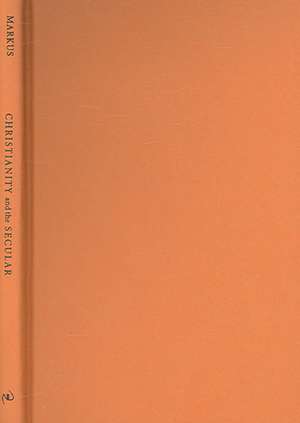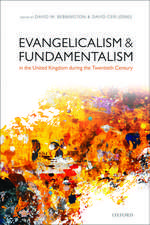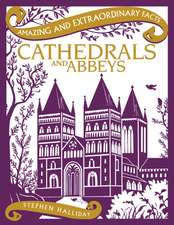Christianity and the Secular: Blessed Pope John XXIII Lecture Series in Theology and Culture
Autor Robert A. Markusen Limba Engleză Hardback – 27 feb 2006
| Toate formatele și edițiile | Preț | Express |
|---|---|---|
| Paperback (1) | 154.71 lei 6-8 săpt. | |
| MR – University of Notre Dame Press – 27 feb 2006 | 154.71 lei 6-8 săpt. | |
| Hardback (1) | 581.09 lei 6-8 săpt. | |
| MR – University of Notre Dame Press – 27 feb 2006 | 581.09 lei 6-8 săpt. |
Preț: 581.09 lei
Preț vechi: 754.67 lei
-23% Nou
Puncte Express: 872
Preț estimativ în valută:
111.21€ • 115.67$ • 91.81£
111.21€ • 115.67$ • 91.81£
Carte tipărită la comandă
Livrare economică 12-26 aprilie
Preluare comenzi: 021 569.72.76
Specificații
ISBN-13: 9780268034900
ISBN-10: 0268034907
Pagini: 112
Dimensiuni: 152 x 229 x 8 mm
Greutate: 0.27 kg
Ediția:1st Edition
Editura: MR – University of Notre Dame Press
Seria Blessed Pope John XXIII Lecture Series in Theology and Culture
ISBN-10: 0268034907
Pagini: 112
Dimensiuni: 152 x 229 x 8 mm
Greutate: 0.27 kg
Ediția:1st Edition
Editura: MR – University of Notre Dame Press
Seria Blessed Pope John XXIII Lecture Series in Theology and Culture
Recenzii
“Markus interweaves his discussion of late antiquity with current debates about the relationship of the Church and the world, showing vividly that the questions of culture and inculturation, of the right relationship with the world, of the secular, secularization, and desecularization, with which the Church currently grapples, are not new. Markus’s interpretation of Augustine will no doubt find detractors, but he shows persuasively that Augustine’s thinking has much to contribute to current debates.” —Theology
“Markus sees the clue to Augustine’s attitude to the secular in his persistent eschatologism. The City of God is neither the Church on earth, nor civil society, but is by contrast in the world to come, where the peace, knowledge, love, and praise of God will receive their ultimate satisfaction.” —The Journal of Theological Studies
“The central argument of the book . . . is that the ‘Christian tradition has a legitimate place for the autonomy of the secular,’ meaning that Christians need not subject all social, political, or cultural institutions to distinctly religious views.” —First Things
“These lectures will not only assist the reader in dealing with the present situation regarding the secular and its relationship to religion, but will place the topic in context beyond the sociological/historical studies in which these arguments are usually framed. The role of Augustine here is extremely important, and students of Augustine will appreciate Markus’s contribution here.” —Catholic Library World
“At a time when the proper boundaries between the sacred and the secular are contested as never before, Robert Markus offers a subtle and persuasive analysis of the roots of this distinction in early Christian theology, including especially, but not only, the writings of Augustine. . . . The resulting work is a historically grounded, theologically sophisticated defense of the proper autonomy of secular public life, its autonomy from religious control, and its place as a legitimate sphere for Christian activity.” —Theology Digest
Notă biografică
Robert A. Markus is professor emeritus at the University of Nottingham. He is the author of several books, including Saeculum: History and Society in the Theology of St. Augustine, The End of Ancient Christianity, and Gregory the Great and His World.
Descriere
"As a contribution to the post-9/11 debate on religions, cultures, and societies, these lectures are as finely attuned to their moment as Robert Markus's classic 1970 study, Saeculum, which they update and extend. Christianity and the Secular challenges all who are concerned with the limits of the 'secular' to take better account of the shaping events and theories of the time in which the Roman Empire turned Christian. A beautifully measured book." —Mark Vessey, Canada Research Chair in Literature / Christianity and Culture, University of British Columbia
"At a time when the proper boundaries between the sacred and the secular are contested as never before, Robert Markus offers a subtle and persuasive analysis of the roots of this distinction in early Christian theology, including especially but not only the writings of Augustine. He argues that the idea of a secular realm of this-worldly practices and concerns, legitimate and independent on its own terms, is Christian in origin and can be defended on theological grounds. At the same time, he also shows that this theological conception of a secular realm need not lead to 'thin' liberalism or to an excessively individualistic view of society. He thus takes issue with leading strands of patristic scholarship—including some tendencies in his own earlier work—as well as engaging with a number of theologians who have recently argued that the secular realm is at best a necessary evil. The resulting work is a historically grounded, theologically sophisticated defense of the proper autonomy of secular public life, its autonomy from religious control, and its place as a legitimate sphere for Christian activity. This is a most timely work, which will further confirm Professor Markus's status as one of the foremost intellectual historians of our day." —Jean Porter, The John A. O'Brien Chair in Theology, University of Notre Dame
















